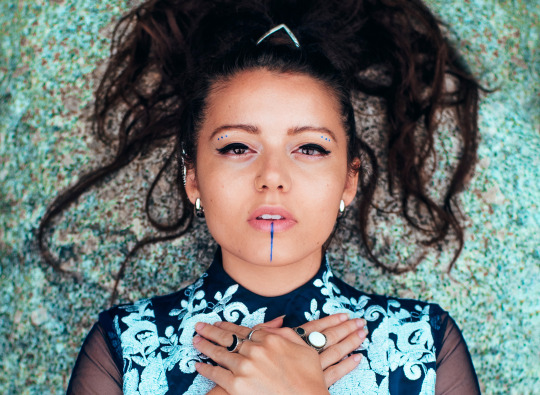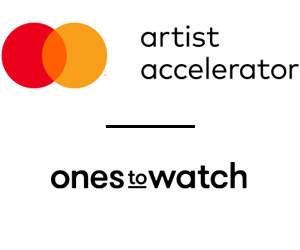Meet Jayli Wolf, the Queer Indigenous Survivor of a Doomsday Cult

Photo: Hayden Wolf
Jayli Wolf is an artist like no other, and I do not say that lightly. Raised in a doomsday cult, Wolf's musical adventure is just that - an adventure. Approaching music not just as an art form but as a space for spiritual healing, the queer indigenous artist creates with a vulnerable and infectious fervor.
The result is her debut EP, Wild Whisper, a striking recounting of generational trauma, growing up in a Doomsday cult, and finding the strength to embrace her sexuality. Rather than have us tell you about it, we invited Wolf to speak on her arresting debut EP and the real-life experiences that inspired it.
- - - - - - - - - -
Wild Whisper is an autobiographical EP that features my father's experience in the Sixties Scoop, leaving the doomsday cult I was raised in, releasing the shame and guilt instilled in me around my bisexuality, depression and mental health, post-traumatic growth, and reclaiming my Indigenous heritage.
I finally have the courage to use my voice to tell these stories. I hope this project will be able to shed more light on the subject matters, raise awareness, and bring comfort in solidarity with the queer community, my Indigenous culture, other survivors of the '60s Scoop', sexual abuse, and high control religious groups.
"BLEED LIKE US"
I was raised in a doomsday cult. My childhood was filled with stories about the end of the world, death, and destruction of the non-believers. This song is about waking up from the lifetime of mental conditioning imposed on me, the painful exodus of being shunned by family and community, and facing my own mental and spiritual Armageddon."CHILD OF THE GOVERNMENT"
From the 1950s into the 1990s, the Canadian Government and the Catholic Church were responsible for taking, or "scooping" more than 20,000 First Nation, MeÌtis, and Inuit children from their families and communities (known as "The Sixties Scoop"). They were placed in foster homes or adopted (accounts of children even being sold) into non-Indigenous families across Canada, the United States, and beyond. Along with the loss of cultural identity, the government went so far as to change some children's true ethnicity on file. Many experienced severe sexual, physical, and emotional abuse.
My father was one of these children.
All the children that were misplaced can never ever get back what was stolen from them. Survivors try their best. My dad and I are lucky because we were able to find our way back home to our blood family, to our community, to each other even. But that's not the story for everyone. Some kids were sold to the USA, or even as far as Australia. Some survivors have since learned that their biological family has passed - those ties are broken forever. I am lucky that I found my way back home, but now the work starts. Now the reclamation begins for me. That's why I want to talk about this.
To the people who say Indigenous people need to get over it, this was happening up until the 1990s. People aren't going to get over the fact that they were ripped out of the arms of their mothers and that the government lied on the adoption papers of these people to make it appear that they weren't Indigenous... that they were sold to other countries. What does it mean to get over it? Do they mean to forget? Because as a society, we don't learn when we forget. That's not what I want for our country.
The truth should be known, and talked about. We can forgive though.
We can forgive for our own healing.
The road ahead is long and change takes time.
But we are not going to forget and I have hope we are on the right path.
"HUSH"
Love is an awful thing to have to hide.
This song is about passion and discovery. Uncovering the pain of suffocating one’s desires for the approval of others, and opening up to the pure, raw, and fierce energy of sexual freedom and liberation.
Being raised in a high control religious group, I felt immense shame around the truth of who I am. My first true love with another girl (a fellow cult member) was filled with guilt and shame. We would pray together for forgiveness over the desires that we had. I believed Jehovah would destroy me in Armageddon.
Being free now from that mental conditioning, and the difficult work of deprogramming I have done over the last several years, I have slowly allowed myself to open up more and expel the shame around my sexuality. I am grateful to have a partner (also an ex-cult member) who understands me and allows me to live in my complete truth. We made the decision of having an open relationship so that we are both free to explore this life and its desires to the fullest. My deprogramming has also allowed me to question the societal conditioning around relationships.
I hope this song brings people feelings of power and freedom in their own personal explorations. It was incredibly liberating to write. Filming the visual put me so in touch with my feminine sexual energy.
"WOULD YOU DIE?"
I wrote this song after feeling true unconditional love for the first time; after that, I learned that conditions and boundaries are very different.
I used to be so fearful of love, of the power I thought another soul could have over me.
My definition of love used to be more of a tragedy than anything else.
As if I would have to die for it.
As if love could swallow me whole.
Now I understand, it's not love that breaks a heart, it is the conditions I used to put on love.
The music video for "Would You Die" is a visual representation of me learning this lesson.
Taking off my armor and baring everything. Following an idea of love through dangerous places and ultimately being completely swallowed up by it.
When I wake up at the end, I realize that I put myself there in that darkness. I buried who I truly was to be loved in return.
This song is about finding self-love. Realizing that "the stars were never mine." That I could let go, that no one belonged to me. That true love is freedom. Freedom from conditions.
"HELL"
Sometimes we get comfortable in the darkness.
We fear our own light and decide it's best not to acknowledge it.
I was surrendering to my depression when I wrote this song.
I wanted to be alone and lose myself to my sadness. That could not have been easy for the people that love me to witness.
Sometimes we just need time to feel it all and make amends with our demons on our own terms. In the end, we are the only ones who can save ourselves.
"RIDE"
This song is a plea from the perspective of our Mother Earth. She is abundant and nurturing, but humanity has taken this for granted. Greed, corruption, and ignorance is poisoning her. We have become so disconnected.
It is our responsibility to live as one with her and care for her as she has given us life.
Chief Seattle said, "We do not inherit the earth from our ancestors; we borrow it from our children."





